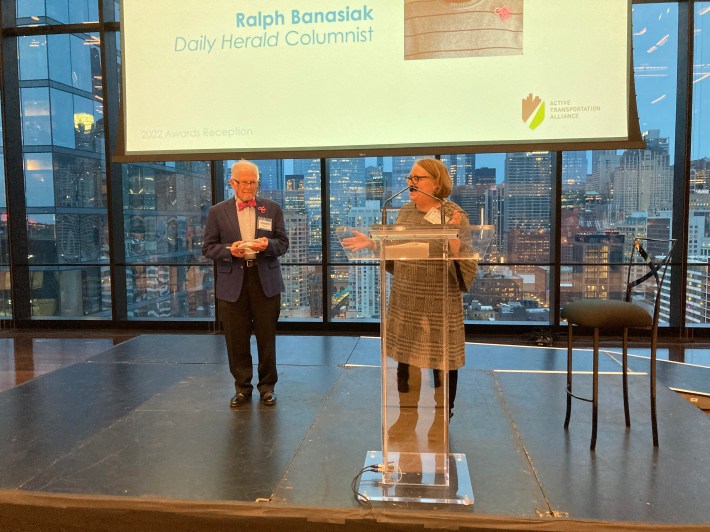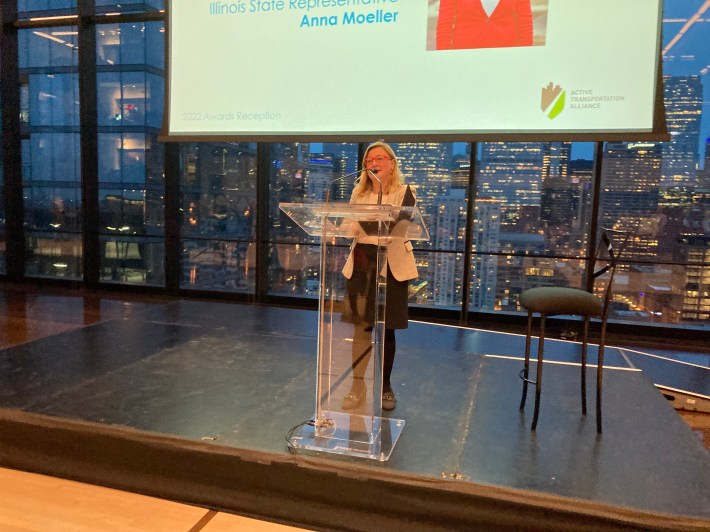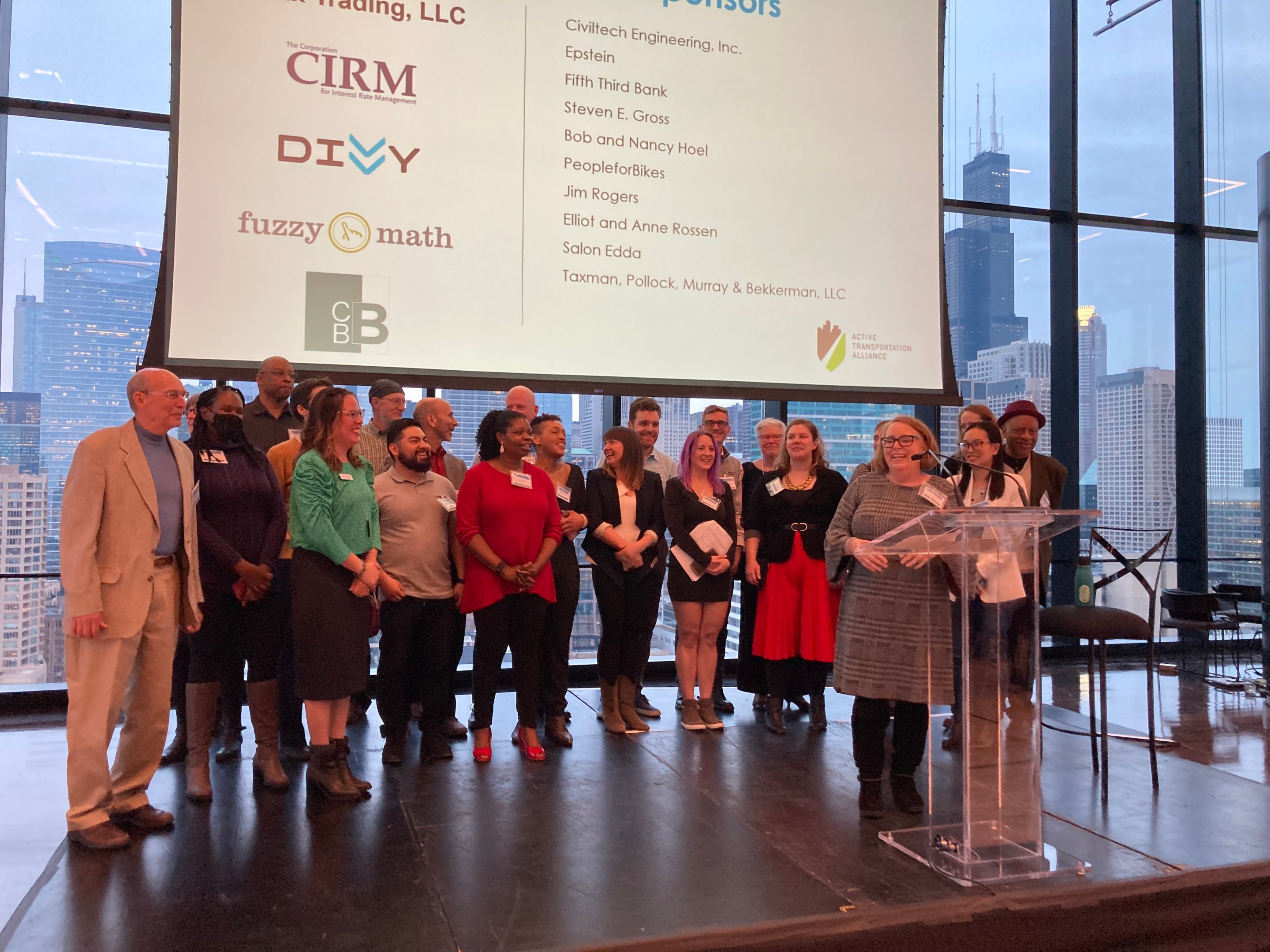The Active Transportation Alliance's annual awards reception gives credit to people who've made a difference for Chicagoland sustainable transportation in the past year. It's also a chance gather many of the movers and shakers from the local advocacy scene in one room to raise money for ATA's important work and celebrate recent accomplishments.
Last Thursday's event took place high above the West Loop, which has seen a boom in transit-proximate development in recent years, on the 17th floor of the 167 (North) Green Street building, with a breathtaking skyline view.
ATA executive director Amy Rynell kicked off the evening by discussing a recent visit to Dallas, which made her appreciate the fact that the Chicago region is relatively transit-friendly. When she tried to find public transportation directions from the airport to her lodgings about 20 miles away, Google Maps told her it would take three hours, three transfers, and lots of walking to get there. "I missed Chicago."
However, she noted that Chicagoland has its own struggles with car-dependency, with more miles of roadway per person than metropolitan New York and LA, and almost as many as Dallas. Moreover, our region actually has worse air quality than Dallas.
Rynell said that out of the city of Chicago’s 4,000-plus miles of streets, only 9 percent have bikeways, and less than one percent have protected bike lanes. CTA buses run on about a third these street miles, but you can basically count the number of miles of bus lanes in Chicago on two hands.
"We indeed have prioritized so much of our space for cars and trucks, which means we are also prioritizing and subsidizing air and noise pollution; the most dangerous mode of travel, and the most expensive and inequitable travel option for residents, personal vehicles. Is this the best use of all this public space and our resources?"
Rynell asked the audience to envision how Chicagoland transportation could be improved. She said ATA is fighting for safe streets for all, including streets crossings that work for children, seniors, and people with disabilities; a citywide grid of protected bike lanes and a regional trail network; and a reliable and accessible transit system, including bus rapid transit routes and other bus-priority street treatments. With recently unprecedented federal, state, local funding now available for infrastructure, she said, "This is the moment for Chicago to do what it has always done best – reinvent our transportation infrastructure, but this time for a greener, more equitable future."

The first awardee of the night was Daily Herald bike columnist Ralph Banasiak, an important voice for improving conditions for cycling in the suburbs, who received the Public Service Award. "As one of the nation’s few bicycling columnists featured in a traditional newspaper, Ralph says he not only wants to inspire more people to cycle, but he also wants to spur more mainstream reporting of sustainable modes of transportation," Rynell said.
"Never would I have imagined that just through the simple pleasure of hopping on a bike, I would wind up speaking in front of a roomful of Chicagoland advocates," Banasiak said. "When you think about it, we are all 'Along for the Ride' [the title of his column.] We are all in this together in one way or another, and we know we can make a difference."
Next Rynell announced a Public Leadership Award for U.S. Senator Tammy Duckworth, a military veteran who lost her legs and partial use of her right arm when her helicopter was shot down over Iraq. "She has experienced firsthand how inaccessible our transit stations are for people in wheelchairs especially," Rynell said. "She’s been unable to get into stations due to elevators not working, unable to exit stations that had three flights of stairs and no elevator. It's just unacceptable for public transit, this great connector to jobs, housing and more, to be unavailable to so many."
Rynell noted that Duckworth successfully pushed for earmarking $1.75 billion from the federal infrastructure bill for retrofitting existing transit stations to make them accessible for wheelchair users and other people with mobility challenges. "This will profoundly change the experience and value of our transit for decades to come. Thank you, Senator Duckworth for working with disability rights advocates from across the country to pass this into law."
Duckworth accepted the award via a prerecorded video. "Every day I am appreciative for all of [ATA's] hard work in helping to make our community's infrastructure safer and more accessible, no matter if we're getting down the street by walking, biking, or rolling," she said.
"Those of us with disabilities are often frustrated by public transportation," the senator added. "I can't ride the 'L' in Chicago, because I never know if a station is going to be accessible or not. But it isn't just a problem in Chicago. It's a problem in Washington D.C., in New York, and for so many of our legacy transit systems. As a strong supporter of public transportation, it's been frustrating to not be able to rely on these systems myself. But as a senator, I'm in a position to do something about it."
Duckworth says she discussed the issue with CTA president Dorval Carter, Jr. He told her that, despite the agency's All Stations Accessibility Program, which outlines a plan for making Chicago transit 100-percent Americans With Disabilities Act compliant by 2038, the CTA could had to prioritize safety projects over accessibility due to limited funding. "So I wrote that act to provide dedicated for accessibility. I'm so proud to have succeeded getting this bill passed into law as part of the Bipartisan Infrastructure Law... I want to thank the Active Transportation Alliance for this wonderful award, and let's continue working together to make it possible for everyone to access transit that will let them live full, engaging, and enriching lives."

Finally Rynell presented a Public Leadership Award to Illinois state representative Anna Moeller, who represents northwest-suburban Elgin and surrounding comunities. She was the chief sponsor of state legislation to eliminate the previously required 20-percent local match for state-funded pedestrian and bike infrastructure projects. Unjustly, that local funding was not required for driving-related infrastructure. "As a result of this law we’ll see safer street designs, particularly in lower-income communities that have been unable to afford the match requirement," the executive director noted.
"If it weren't for this organization and all of you reaching out to legislators and writing letters to the editor, and letting people know just how important this bill was, this bill wouldn't have happened," Moeller said. "It's unfair that for decades local governments were responsible for picking up 20 percent of the cost of bike paths and sidewalks, when new roads were being put in. Because we know we have a lot of local governments out there who frankly can't afford that cost."
"This was denying residents across our state the ability to walk to businesses, to walk to school, to connect their neighborhoods together, and to use bike paths for recreational purposes and for transportation purposes," Moeller added. It was denying hundreds of thousands of residents the ability to take a healthier and more affordable option for transportation."
Rynell closed the presentation by informing attendees about two upcoming advocacy opportunities:
- Virtual discussions to help inform ATA's Sustainable Transportation Platform for state elections on Tuesday, May 3 at 6 p.m., and Wednesday, May 3 at noon.
- The Chicago Ride of Silence, which honors those that have been injured or killed while biking, on Wednesday, May 18, meeting at 5:30 p.m. at the Thompson Center, 100 W. Randolph St.





